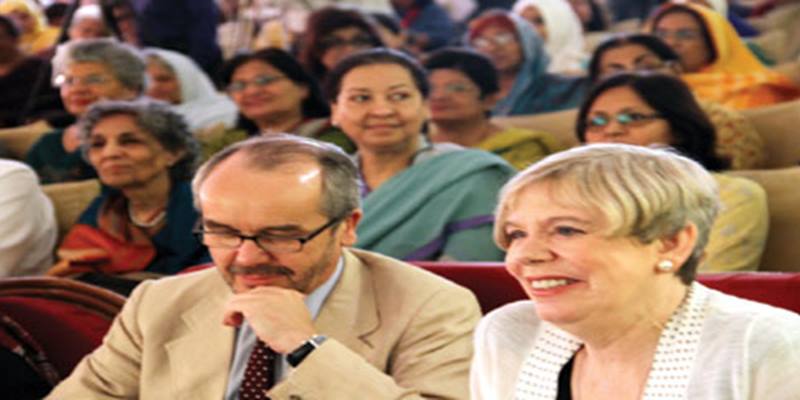By Huma Imtiaz
When a literary festival’s headliner is author and religious thinker Karen Armstrong, one wonders whether to be amused, or descend into a cloud of depression.
At the second Karachi Literature Festival (KLF), as one saw hundreds of people pour into the hall to hear Ms Armstrong speak at the inaugural session, the choice was made: depression. Armstrong stood on the dais and lectured Pakistanis on how we must be more compassionate and coiffed hairdos nodded in agreement. Even the wonderful classical dance performance set to the Sufi kalam “Aaj Rang Hai” did little to enliven one’s spirits. A renowned author remarked wryly, “We love to be told that our religion is one of peace.”
Others such as writer Mohsin Hamid, though, felt that as a writer who takes her writing ‘seriously’, there was nothing odd about Armstrong being the keynote speaker at a literature festival. “Literature festivals are about writing that is provocative and inventive, and Armstrong is an important thinker”, he said.
While Armstrong urged Pakistanis to adopt compassionate behaviour, citing examples from multiple religions and even Greek mythology, a few hours later it was author and journalist Ahmed Rashid who hit the nail on its head on Pakistan and its relationship with compassion by highlighting how Pakistan’s government could not find a prosecutor for the trial of Mumtaz Qadri, the assassin of the late Punjab governor Salmaan Taseer.
In a change from last year, the KLF organisers decided to focus on non-fiction as well this year, with journalists and authors such as Ahmed Rashid, Zahid Hussain, Maleeha Lodhi and Ayesha Siddiqa in multiple sessions, which made a welcome change from the overwhelming focus on English-language fiction written by Pakistani authors. Extremism and the state of Pakistan were topics that inevitably arose in many sessions. In a session titled ‘Reimagining Pakistan’, defence analyst and author of Military Inc., Siddiqa asked “Do we even have the capacity to re-imagine Pakistan?” Bemoaning the demise of social sciences and the lack of political scientists, Siddiqa asked where Pakistan’s next generation was. Pervez Hoodbhoy began his talk by saying, “I know people like to be reassured, and I hope other people here do that.” Dubbing Pakistan as a seething mass of discontent, Hoodbhoy declared that ‘a clerical tsunami is heading towards us.’
And while the superstars of Pakistan’s literary scene such as Mohsin Hamid, Kamila Shamsie, Daniyal Mueenuddin and Mohammed Hanif, who pen fiction in English, drew some of the biggest crowds, it was Intizar Husain’s session with writer Raza Rumi that was by far one of the best.
In another session, Hanif introduced a colourful variety of Punjabi and Sindhi poets and writers, whose work covered everything from terrorism to the beauty of a village in Okara. Bilal Tanweer, writer and translator, spoke about the art of translation, and highlighted the lack of recognition that translators get for ‘transcreating’ someone’s work.
Though security fears are paramount in everyone’s minds considering Pakistan’s fragile security situation, one still wonders why the organisers of the KLF chose the dreary and secluded Carlton Hotel as their venue. In a festival that is supposed to be for Karachi, the venue remains largely inaccessible to those it should be targeting: Karachiites. The hotel is miles from the nearest bus stop, and for a young, broke student who would have benefited greatly from attending the festival and meeting some of Pakistan’s finest writers, it remained out of reach.
The organisers, however, while agreeing that the venue was not as accessible as they would have liked, defended their choice. Raheela Baqai, the marketing director of the Oxford University Press, said that “All the other hotels are in the centre of the city, we couldn’t risk putting 10,000 people at risk. Yes, the venue was inaccessible by public transport like buses, but we had to compromise somewhere, because Carlton Hotel has a great security set up.”
Another bone of contention expressed by many was how unimaginatively the organisers British Council and Oxford University Press had made up the schedule. While some, such as Ms Armstrong, were given two sessions, Alex Von Tunzelmann, author of the acclaimed Indian Summer, was only asked to moderate a single session. The works of prominent authors Basharat Peer and Sadia Shephard were not available at the bookstalls at the festivals. In an unusual choice, Javed Jabbar was asked to share his expertise as a filmmaker, a decision that took some by surprise.
While it is heartening to see that Karachi is hosting an event that promotes writing and discussion and brings together authors and their fans, it is time that the event morph from its current state into one for all of Karachi, and not for a select few.
The writer works as a freelance journalist



